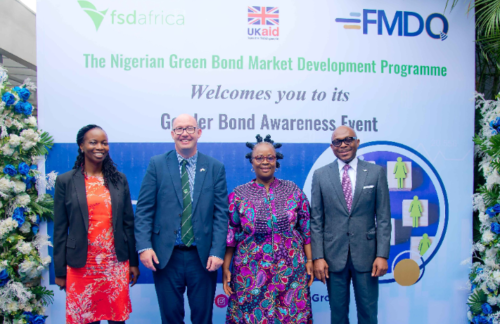
L – R: Ms. Mary Njuguna, Principal Specialist, Capital Markets, FSD Africa; Mr. Ben Llewellyn-Jones OBE, Deputy High Commissioner, British Deputy High Commission, Lagos; Ms. Beatrice Eyong, United Nations Women Country Representative to Nigeria; and Mr. Bola Onadele. Koko, Chief Executive Officer, FMDQ Group PLC, at the Nigerian Green Bond Market Development Programme Gender Bond Event held in Lagos.
External shocks such as pandemics, climatic disruptions, and economic downturns, have continuously had adverse impacts on humanity, with vulnerable groups, such as women, and their businesses being badly hit. Consequently, financial market players globally, as well as in Africa, are now empowering women and expanding their access to finance and economic inclusion through a debt market instrument that seeks to support the advancement and equality of women – the gender bond. Although at its emerging stage, understanding the gender bond framework for Nigeria’s debt market can play a crucial role in supporting the efforts to attain the United Nations (UN)’s 2030 Sustainable Development Goals (SDGs) 5 and 10 – Gender Equality and Reduced Inequalities, respectively.
In attendance at the event were Mr. Ben Llewellyn-Jones OBE, Deputy High Commissioner, British Deputy High Commission, Lagos, Ms. Beatrice Eyong, United Nations Women Country Representative to Nigeria, Mr. Bola Onadele. Koko, Chief Executive Officer, FMDQ Group PLC, Ms. Ruth Zaipuna, Chief Executive Officer, NMB Bank PLC, Ms. Mary Njuguna, Principal Specialist, Capital Markets, FSD Africa, as well as other market stakeholders.
The first day featured a Breakfast Session for C-Suite Executives, and highlighted the impact sustainable finance can have in driving women’s economic empowerment, as well as increased participants’ knowledge and awareness of gender bond. Welcoming participants to the event, Mr. Bola Onadele. Koko, Chief Executive Officer, FMDQ Group PLC, gave a broad overview of the Programme’s achievements from its inception in 2018 till date in the areas of policy advisory, technical support for green bond issuances, and market capacity building. He challenged everyone within their individual areas of expertise to be encouraged by the progress of the Programme as it relates to green bonds and similarly, push the envelope with gender bonds as we continue to develop and entrench the principles of sustainability in the Nigerian capital markets whilst facilitating prosperity for all.
The Breakfast Session featured a panel discussion themed, “The Role of Financial Markets in Strengthening Gender Financing in Nigeria”, with panelists including the Chief Executive Officer of NMB Bank PLC of Tanzania, a representative of British International Investment PLC, an Associate Director of PwC Nigeria, a representative of FMDQ Securities Exchange Limited, a Deputy Director of the Securities and Exchange Commission, Nigeria, and the Gender Network Manager, FSD Africa. The panelists established the business case for investing in women owned/led businesses, women-focused initiatives and the urgency for closing the $42.00 billion gender financing gap in Africa. Also, the panelists reiterated the importance of leveraging sustainable and innovative financial instruments such as gender bond in financing women owned/led businesses.
The second day presented a Masterclass which featured a deep-dive into the modalities surrounding the issuance of NMB Bank PLC’s first gender bond in Tanzania (Jasiri Bond). The Treasurer of NMB Bank PLC, during his session, stirred the zeal of potential issuers to the impact of women empowerment through a gender bond as he shared the stories of the beneficiaries of the NMB Bank PLC’s Jasiri Bond. According to Sustainalytics, a global leader in Environmental, Social and Governance (ESG) research, and a technical partner for the gender bond awareness sessions, the key steps required for a gender bond issuance include the development of a framework, disclosure of information to an external reviewer, documentation of a second opinion, development of a pre-issuance report, and annual documentation of the impact of the gender bond.
The event ended with the Implementing Partners of the Programme reiterating their commitment to support institutions willing to bridge the gender finance gap, as well as other sustainable financing gap in Nigeria, through financial instruments like sustainable or sustainability-linked bonds i.e., gender bonds, green bonds, blue bonds, social bonds, etc. The Programme was launched in 2018 to create awareness and education on green finance, whilst serving as the primary vehicle to explore and implement initiatives geared towards accelerating the development of the Nigerian Green Bond Market and supporting broader debt market reforms that impact green bonds, through its Implementing Partners, FMDQ Group and FSD Africa.
FMDQ Group is Africa’s first vertically integrated financial market infrastructure (FMI) group, strategically positioned to provide registration, listing, quotation and noting services; integrated trading, clearing & central counterparty, settlement, and risk management for financial market transactions; depository of securities, as well as data and information services, across the debt capital, foreign exchange, derivatives and equity markets, through its wholly owned subsidiaries – FMDQ Securities Exchange Limited, FMDQ Clear Limited, FMDQ Depository Limited and FMDQ Private Markets Limited. As a sustainability-focused FMI group, FMDQ Group, through FMDQ Exchange, operates Africa’s premier Green Exchange – FMDQ Green Exchange – positioned to lead the transition towards a sustainable future.
FSD Africa is a specialist development agency established in 2012 by the UK Government working to make finance work for Africa’s future. With presence in over thirty (30) African countries, FSD Africa is positioned to mobilise “green plus” finance that will power economic and social development, while delivering environmental gains and building Africa’s resilience, by working on policy and regulatory reforms, capacity strengthening, improving financial infrastructure, and addressing systemic challenges in Africa’s financial markets to spark large-scale and long-term change.









